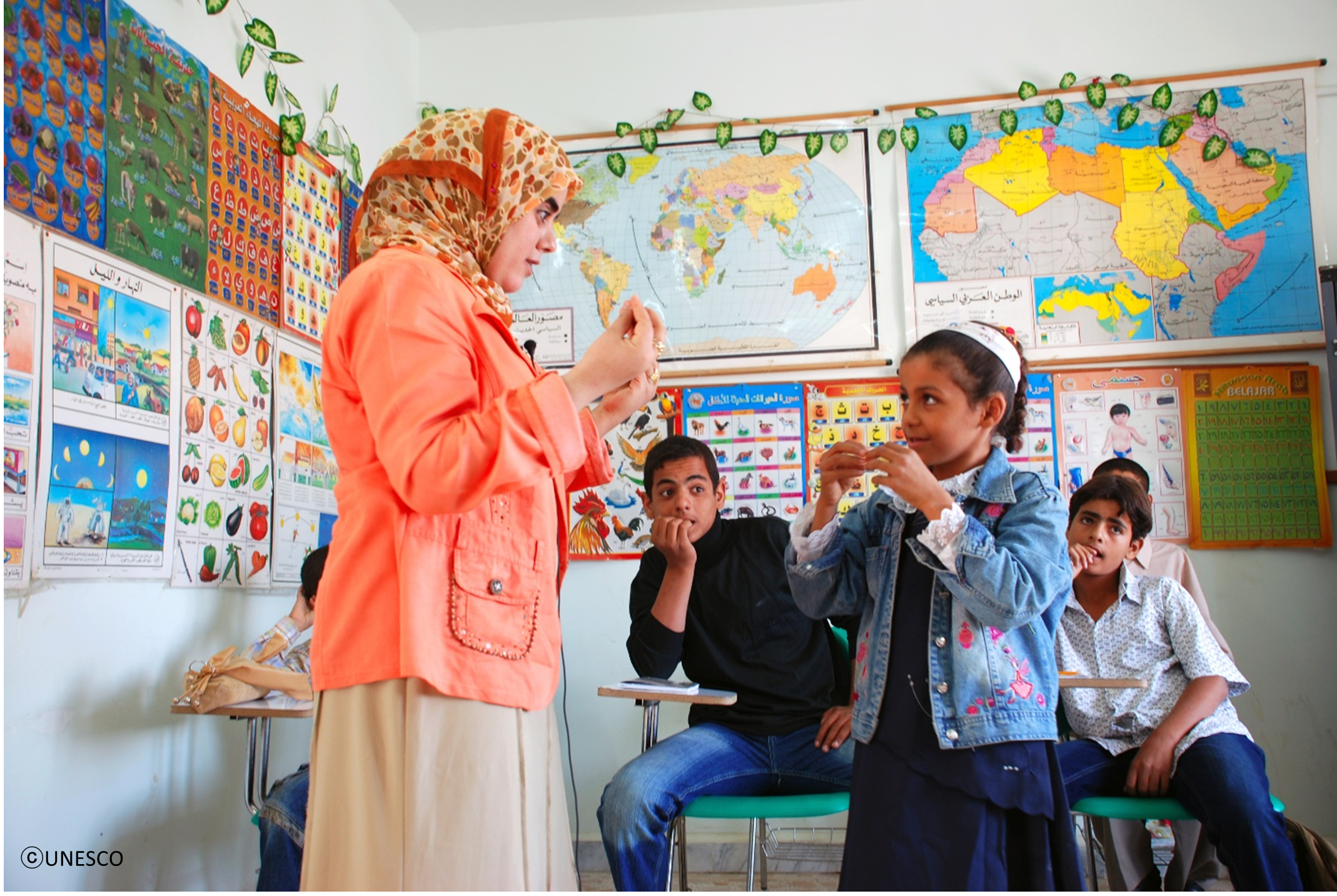العودة

Teachers have the power to transform education
المعلّمون والمعلمات
2022 - 08 - 19
“To genuinely transform education, we must build a workforce of teachers who are engaged, respected and properly resourced.”

In preparation for the Transforming Education Summit in September, Ministers of Education convened in Paris with hundreds of youths, education practitioners, and other relevant parties to strengthen efforts towards SDG4. The meeting examined ways to fulfill existing commitments, come up with fresh ideas to recover from the devastating impact of the pandemic on learning, to build more resilient and sustainable educational systems. A campaign was launched to put teachers, teaching, and the teaching profession at the forefront of education transformation with the aim of getting the education community back on track and revitalizing efforts to achieve SDG4 by 2030.
Achieving better learning outcomes requires well-qualified, trained, adequately remunerated, and motivated teachers. Learning results suffer in many regions of the world because education institutions are short on teachers, classrooms are overcrowded, and teachers are overworked, demotivated, and unsupported. In addition to the education disruptions caused by COVID-19, the quantitative and qualitative "teacher gap" is seriously impeding efforts to achieve education targets and SDG4. Children who live in rural regions or in vulnerable and marginalized populations are particularly impacted. There is an increasing global teacher shortage, and many countries are in desperate need of instructors. The fact that teachers, in many nations, lack the minimum levels of training and credentials exacerbates the teacher shortage.
Besides the issue of bridging the teacher gap, it is also essential to improve access to technology for both teachers and learners, especially in underdeveloped, developing and low-income countries. Technology in education supports different learning styles, develops skills, encourages communication, prepares learners for the world of work, and opens learning to more children and youth. It is also elementary to better equip teachers to adapt their teaching practices and use ICTs as a complementary tool, a means to an end, rather than an end in itself.
Governments should join hands with civil society organizations and actors to foster respect, trust, and appreciation for teachers and the important role they play in teaching future generations. To increase the number of teachers in the workforce, provide them with training opportunities and support, include them in decision-making, and elevate the status of the profession, serious commitment and investment are required.
If the goal is to truly transform education, it is essential to ensure that teachers are committed, well-respected, and supported. There is still a lot to be done. When teachers are better prepared, inspired, and empowered, they can be key actors in transforming educational systems and play a significant role in overcoming the global education crisis. We can only rethink education and fulfill the promise of high-quality education for all by working together.
This article is based on information taken from the website of the International Task Force on Teachers for Education 2030.
أحدث المنشورات
القائمة الكاملةاليونسكو
المستقبل على المحك: لماذا الاستثمار في التعليم أمر بالغ الأهمية؟
يسلط هذا التقرير، الذي أعدّته اللجنة التوجيهية الرفيعة المستوى المعنية بالهدف الرابع من أهداف التنمية المستدامة (SDG4) بالتعاون مع الشراكة العالمية من أجل التعليم (GPE) ونُشر في عام 2024، الضوء على الحاجة المُلِحّة لتعزيز الاستثمار في التعليم كوسيلة أساسية لمواجهة التحديات العالمية، بما في ذلك تغيّر المناخ، والتطورات التكنولوجية، والتحوّلات الديموغرافية.
اليونسكو
المدن العربية تتألق في جوائز مدن التعلم لليونسكو لعام 2024
تُحرز المدن العربية تقدمًا كبيرًا في مجال التنمية المستدامة والتعلم مدى الحياة، مع تركيز متزايد على إنشاء بيئات تعليمية شاملة تُسهم في تحقيق الأهداف التنموية المحلية والعالمية. وقد احتفلت جوائز مدن التعلم لعام 2024، التي تُمنح من قِبَل اليونسكو، بهذه الجهود، مبرزةً المدن العربية التي تميزت في بناء مجتمعات تعليمية.
اليونسكو
مؤتمر اليونسكو العالمي الثالث للموارد التعليمية المفتوحة: تعزيز الوصول الشامل إلى المعرفة
انطلق مؤتمر اليونسكو العالمي الثالث للموارد التعليمية المفتوحة (OER) في 19 نوفمبر/تشرين الثاني 2024، في مركز دبي التجاري العالمي في دولة الإمارات العربية المتحدة، ليكون المرة الأولى التي يُستضاف فيها هذا الحدث في العالم العربي. نظّم مؤتمر اليونسكو بالتعاون مع مؤسسة محمد بن راشد آل مكتوم للمعرفة (MBRF)واستقطب أكثر من 500 مشارك ومشاركة من نخبة القادة العالميين، وصنّاع السياسات، وممثلي المؤسسات التعليمية، بما في ذلك وزراء، وأكاديميون، وخبراء من القطاع الخاص. وتركّزت المناقشات على مدار يومين حول تعزيز الاستفادة من الموارد التعليمية المفتوحة والتقنيات الناشئة، بهدف تحقيق وصول عادل وشامل إلى التعليم، وتقليص الفجوة الرقمية على الصعيد العالمي.
اليونسكو
الأمم المتحدة تحتفي في شهر ديسمبر/كانون الأول بحقوق الإنسان، والأشخاص ذوي الإعاقة، واللغة العربية
تُحيي الأمم المتحدة في شهر ديسمبر/كانون الأول ثلاث مناسبات بارزة تُعنى بحقوق الإنسان، وبحقوق الأشخاص ذوي الإعاقة، وباللغة العربيّة، ممّا يجعل هذا الشهر فرصةً عالميّةً للتفكير والعمل. وتقود اليونسكو الجهود لتعزيز التعليم الشامل، وحماية حقوق الإنسان، والاحتفاء بالإرث الثقافيّ واللغويّ للّغة العربيّة، من خلال سلسلة من الفعاليات والمبادرات.